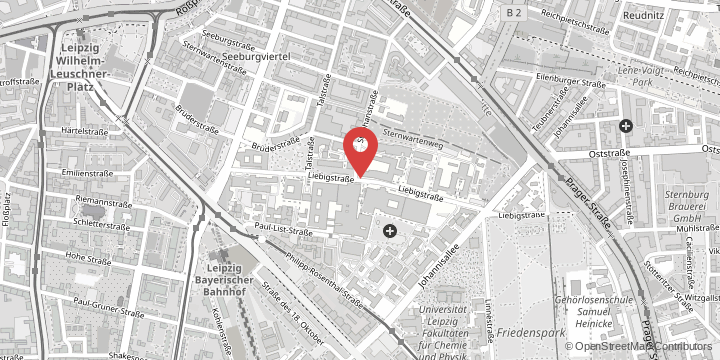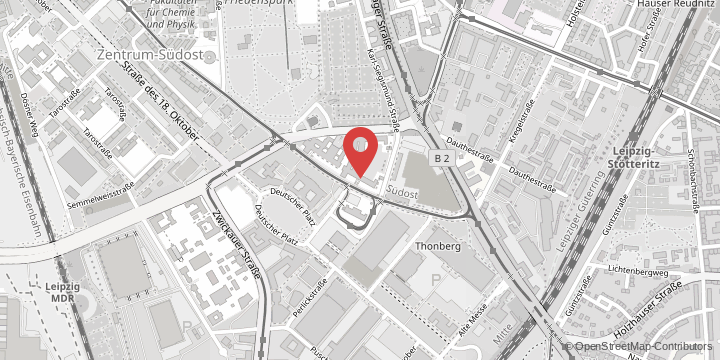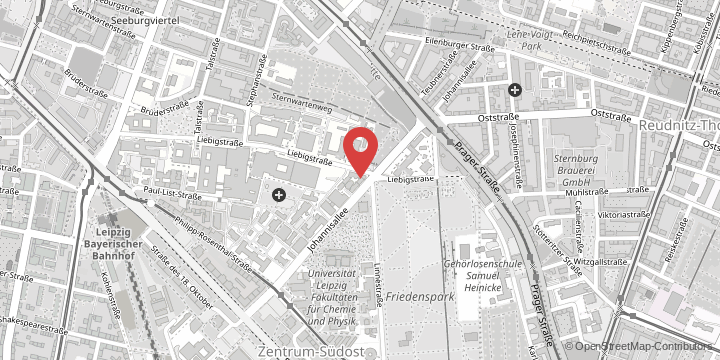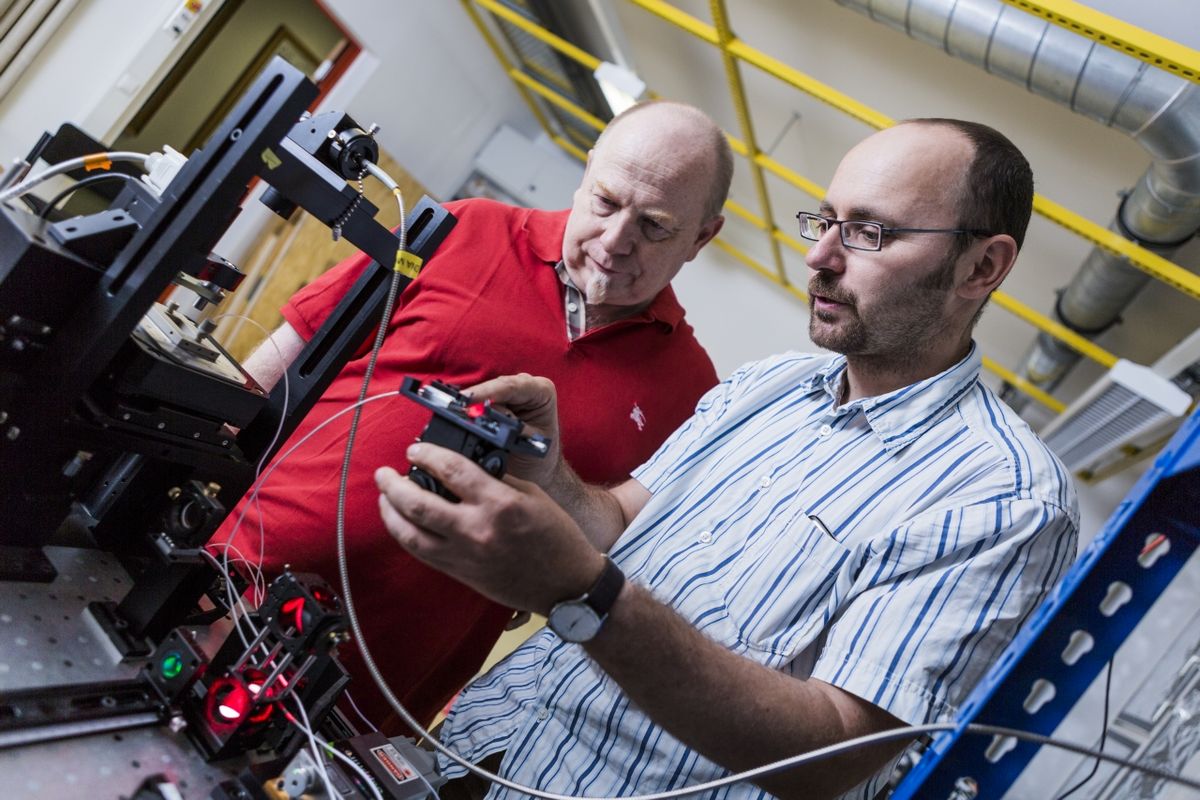Forscherinnen und Forscher unserer Universität haben in den vergangenen Jahren zahlreiche EU-Projekte eingeworben. Die wichtigsten Einwerbungen stellen wir Ihnen hier vor.
Horizon Europe
Im Jahr 2021 startete das aktuell laufende Rahmenprogramme für Forschung und Innovation "Horizon Europe". Forscher der Universität Leipzig konnten bereits zahlreiche Projekte einwerben. Im Folgenden finden Sie die wichtigsten:
ERC-Projekt (Förderung durch den Europäischen Forschungsrat)
- Prof. Dr. Alexej Bufetov
ERC Starting Grant „Integrable Probability” (2022 – 2027) - Prof. Dr. Gesa Hartwigsen
ERC Consolidator Grant „The Flexible Brain: (Re-)shaping Adaptation in Semantic Cognition” (2023 - 2027) - Prof. Dr. Ana Bastos
ERC Starting Grant „Forest vulnerability to compound extremes and disturbances in a changing climate” (2024 – 2027) - Prof. Dr. Dejan Gajic
ERC Starting Grant „The Mathematical Analysis of Extremal Black Holes and Gravitational Radiation” (2022 – 2028)
Koordinierte Verbundprojekte
- SOLO – Soils for Europe
Koordinator: Dr. Carlos António Bastos de Morais Guerra - PREPARE-TID – Pipeline for Rapid Diagnostics of Emergency Transboundary Infectious Diseases
Koordinator: Dr. Ahmed Abd El Wahed
Verbundprojekte mit Förderung über 600.000 Euro
- OpenWebSearch.EU – Piloting a Cooperative Open Web Search Infrastructure to Support Europe's Digital Sovereignty (2022-2025)
Juniorprof. Dr. Martin Potthast (Institut für Informatik) - DYNAMO – DYnamic control in hybrid plasmonic NAnopores: road to next generation multiplexed single MOlecule detection (2022-2026)
Prof. Dr. Ralf Seidel (Peter-Debye-Institut für Physik der weichen Materie) - CREATIC – Central European Advanced Therapy and Immunotherapy Centre (2023 - 2029)
Dr. Dr. Maik Friedrich (Institut für Klinische Immunologie) - CERTAINTY – A CEllulaR immunoTherapy virtuAl twin for personalIsed cancer treatmeNT (2023 - 2028)
Prof. Dr. Thomas Neumuth (ICCAS - Innovation Center Computer Assisted Surgery) - ARTEMIS – AcceleRating the Translation of virtual twins towards a pErsonalised Management of fatty lIver patients (2024 - 2027)
Dr. Stefan Höhme (IZBI - Interdisziplinäres Zentrum für Bioinformatik)
Horizont 2020-Projekte
Im Rahmenprogramm „Horizont 2020“ (2014-2020) lag das im Durchschnitt pro Jahr eingeworbene Budget signifikant über den Einwerbungen vorheriger Programme. Im Folgenden finden Sie die wichtigsten der 75 H2020-Projekte.
ERC-Projekte (Förderung durch den Europäischen Forschungsrat)
- Prof. Dr. Christine Beemelmanns
ERC Starting Grant "Deciphering Bacteria-induced Morphogenesis and Protection in marine Eukaryotes" (2022-2024) - Prof. Dr. Lukasz Grabowski
ERC Startoing Grant "Limits of Structures in Algebra and Combinatorics" (2022-2025) - JP Dr. Sebastian Grüneisen
ERC Starting Grant "ORIGINSOFCORRUPTION – The developmental origins of corruption: A cooperative perspective" (2021 – 2026) - Prof. Dr. Axel Körner
ERC Advanced Grant "Transopera – Opera and the Politics of Empire in Habsburg Europe 1815-1914" (2021 – 2026) - Dr. Ruth Stassart
ERC Starting Grant "AxoMyoGlia – Spatio-functional cellular interplay in peripheral nerve diseases" (2021 – 2025) - Prof. Dr. Stefan Hallermann
ERC Consolidator Grant „PreSynPlast - Molecular mechanisms of presynaptic plasticity“ (2020 – 2025) - Prof. Dr. Alfons Käs
ERC Advanced Grant „HoldCancerBack – What Holds Cancer Cells Back?“ (2017 – 2022) - Prof. Dr. Ralf Seidel
ERC Consolidator Grant „ZIPgeting – Quantitative understanding of target recognition on DNA based on directional zipping processes“ (2017 – 2022) - Prof. Dr. László Székelyhidi
ERC Consolidator Grant „DIFFINCL – Differential Inclusions and Fluid Mechanics“ (2017 – 2022) - Prof. Dr. Nico Eisenhauer
ERC Starting Grant „ECOWORM – Ecosystem Responses to Exotic Earthworm Invasion in Northern North American Forests” (2016 – 2021) - Prof. Dr. Martin Haspelmath
ERC Advanced Grant „FormGram – Form-frequency correspondences in grammar” (2015 – 2020)
Koordinierte Verbundprojekte
- PAPA-ARTIS – Paraplegia Prevention in Aortic Aneurysm Repair by Thoracoabdominal Staging with ‘Minimally-Invasive Segmental Artery Coil-Embolization’: A Randomized Controlled Multicentre Trial (2017 – 2022)
Projektleiter: Prof. Dr. Christian Etz - CONTESTED_TERRITORY – From Contested Territories to alternatives of development: Learning from Latin America (2020 – 2023)
Projektleiter: Dr. Michael Janoschka
Verbundprojekte mit einer EU-Förderung für die Universität Leipzig über 600.000 Euro
- BETA3_LVH – A multi-center randomized, placebo-controlled trial of mirabegron, a new beta3-adrenergic receptor agonist on left ventricular mass and diastolic function in patients with structural heart disease (2015 – 2020)
Projektleiterin: Dr. Oana Brosteanu - RETHRIM – Restoring tissue regeneration in patients with veceral Graft versus Gost Disease (2015 – 2021)
Projektleiter: Prof. Dietger Niederwieser (emeritiert) / Dr. Michael Cross - ImSAVAR – Immune Safety Avatar: nonclinical mimicking of the immune system effects of immunomodulatory therapies (2019 – 2025)
Projektleiter: Prof. Markus Löffler - ENZYCLE - Microbial ENZYmes for treatment of non-recyCLEd plastic fractions (2020 – 2024)
Projektleiter: Prof. Dr. Jörg Matysik
Strukturfonds-Projekte
Europäisches Geld fließt auch über die Strukturfonds an die Universität Leipzig. Im Rahmen des Europäischen Sozialfonds (ESF) sowie des Europäischen Fonds für Regionale Entwicklung (EFRE) wurden bereits zahlreiche Forschungsprojekte gefördert. Einen vollständigen Überblick bietet eine halbjährlich aktualisierte Liste der geförderten Vorhaben des Freistaates Sachsen für ESF und EFRE.
Große aktuell laufende Projekte mit EFRE-Förderung:
- „Data Mining und Wertschöpfung“ (2018 – 2022) ist ein Kooperationsprojekt mit dem Fraunhofer-Zentrum für Internationales Management und Wissensökonomie (IMW)
- "Aufstockung der Geräte-Ausstattung des strategischen Forschungsfeldes "Intelligente Methoden und Materialien" zur Stärkung der anwendungsorientierten Forschung" (2020 – 2021)
- "Aufstockung der Geräte-Ausstattung des strategischen Forschungsfeldes "Nachhaltige Grundlagen für Leben und Gesundheit" zur Stärkung der anwendungsorientierten Forschung" (2020 – 2021)
- "Landesinnovationspromotionen 2023" (Projekt-Nr. 100670471, 2023 – 2027)
FP7-Projekte
Im 7. Forschungsrahmenprogramm der EU (kurz „FP7“) mit einer Laufzeit von 2007 bis 2013 ist es den Forscherinnen und Forschern unserer Universität gelungen, 75 Projekte mit einem Gesamtbudget von rund 26 Millionen Euro zu akquirieren. Diese setzen sich wie folgt zusammen:
• 57 Verbundprojekte, davon fünf als Koordinator
• 5 ERC-Projekte (Auszeichnungen des Europäischen Forschungsrats für Individualleistungen)
• 11 institutionelle Marie-Curie-Projekte, davon eins als Koordinator
• 2 individuelle Marie-Curie-Projekte
































































